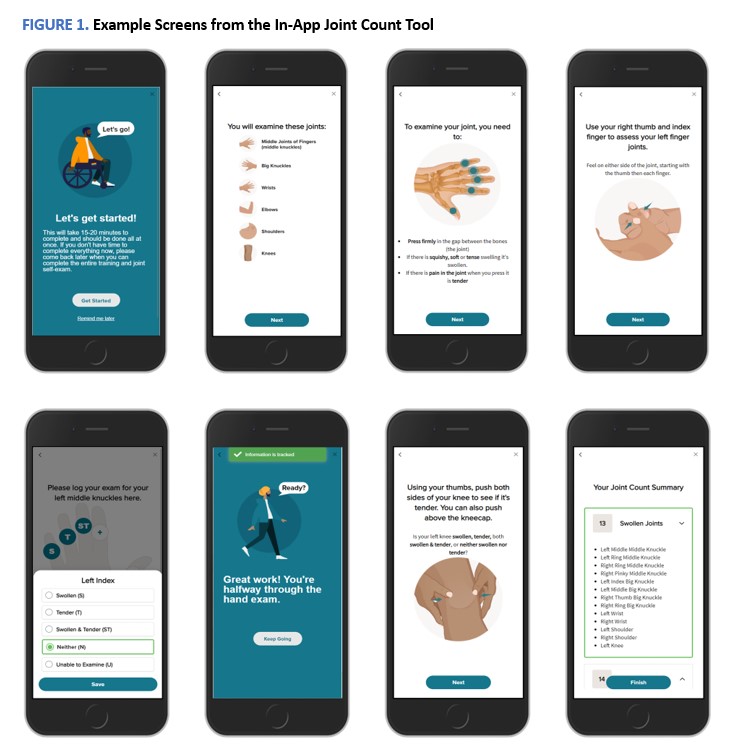Session Information
Date: Tuesday, November 14, 2023
Title: (2019–2038) Patient Outcomes, Preferences, & Attitudes Poster III
Session Type: Poster Session C
Session Time: 9:00AM-11:00AM
Background/Purpose: Telehealth services and, increasingly, remote therapeutic monitoring, can be used to enable the continuum of clinical care in out-of-office settings. This remotely provided care can increase personalization of healthcare by using patient-relevant data, but lack of opportunity for in-person examination may remain a barrier. Our objective was to develop and pilot a smartphone application (app)-based program to teach patients to perform guided self-examination to measure the disease activity of their rheumatoid arthritis (RA), to facilitate remote care.
Methods: An in-app tool to instruct patients with RA to conduct a self-guided 28 tender and swollen joint count (28-TJC, 28-SJC) was developed for the ArthritisPower research registry app based on previously developed videos1. An instructional script of on-screen messaging and animations was iteratively refined by the study team of physicians, researchers, patients, and patient advocates. A storyboard of the final script was user tested with ArthritisPower members living with RA. The tool was then piloted in the ArthritisPower app by RA patients in a community rheumatology practice to gain feedback on the user interface and user experience. Participation in the pilot consisted of registering for ArthritisPower, completing six physical and social health patient reported outcomes (PROs) (PROMIS measures for Pain Interference, Physical Function, Fatigue, and Satisfaction with Participation in Discretionary Activities; RADAI-5; and OMERACT RA Flare), and completing the guided, self-conducted 28-TJC, 28-SJC. The in-app assessment was compared to in-person assessment by a rheumatologist within 6 days of a scheduled office visit.
Results: Five RA patients participated in the pilot testing. The mean (SD) time to completion for the PROs and joint self-assessment tool was 18.3 (3.5) minutes, with the PROs taking 5.4 (0.9) minutes on average and the joint self-assessment taking 12.9 (3.5) minutes on average to complete. Based on this pilot, edits were made to the tool. These included simplifying the language in the registration process, clarifying what was required to successfully complete participation and the expected time commitment, clarifying concepts of tender and swollen joints, adding inspirational progress messaging, and refining the instructional tool. Example screens from the in-app module can be found in Figure 1.
Conclusion: Piloting in real-world settings highlighted areas for change that are hoped to increase successful participation, such as simplifying language, clarifying requirements, and adding motivational messaging. The refined tool is currently being deployed in a larger study to evaluate the accuracy and utility of patient-conducted TJC and SJC for guiding RA management decisions. 1Grainger, et al. ACR Open Rheum. 2020;2(12):705-709.
To cite this abstract in AMA style:
Gavigan K, Curtis D, Curtis J, Nowell W, Ali D, Soares N, Cush J, Grainger R, Jinka M, Sodhi S, Fortune N, Venuturupalli S. Developing a Guided Joint Self-Exam for Rheumatoid Arthritis Patients to Use in Telehealth-Delivered Care [abstract]. Arthritis Rheumatol. 2023; 75 (suppl 9). https://acrabstracts.org/abstract/developing-a-guided-joint-self-exam-for-rheumatoid-arthritis-patients-to-use-in-telehealth-delivered-care/. Accessed .« Back to ACR Convergence 2023
ACR Meeting Abstracts - https://acrabstracts.org/abstract/developing-a-guided-joint-self-exam-for-rheumatoid-arthritis-patients-to-use-in-telehealth-delivered-care/

